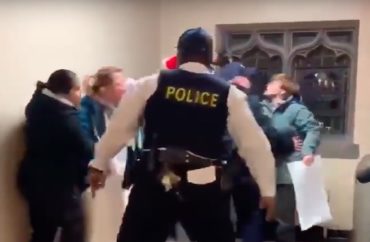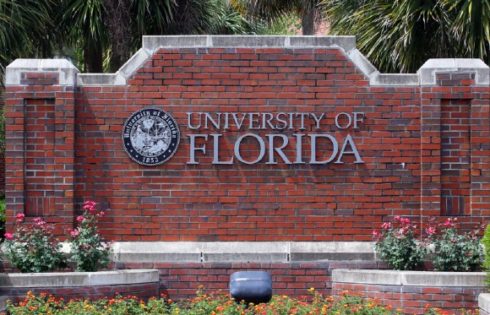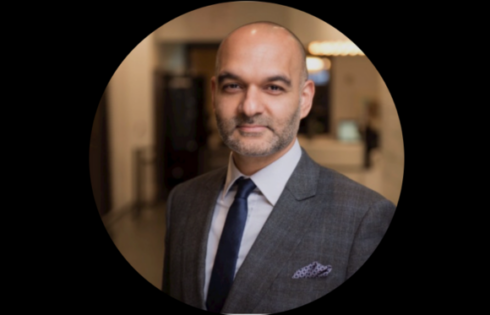
Asks if they realize journalists may have only non-police evidence from protest
When the student newspaper apologized for the sin of reporting on an unhinged protest against former Attorney General Jeff Sessions at Northwestern University last week, many professional journalists expressed disbelief that college journalists would openly renounce basic journalism practices.
They spent less time focused on the actions of the protesters themselves. The dean of Northwestern’s Medill School of Journalism has made up for the imbalance.
In a fiery statement Tuesday, Charles Whitaker focused his vitriol on the “vitriol and relentless public shaming” the student protesters had visited up The Daily Northwestern staff, who issued their apology after being “beat into submission”:
As the dean of Medill, where many of these young journalists are trained, I am deeply troubled by the vicious bullying and badgering that the students responsible for that coverage have endured for the “sin” of doing journalism.
He reminded the petulant protesters of the “great risk” that journalists often throw themselves into “not only to expose malfeasance, misfeasance and injustice, but also to hold a mirror up to society and reflect the maneuverings in our daily lives.”
Student activists have also approached him to complain that “they and their peers were depicted” in news coverage for their public protest, Whitaker said. He told them that the Daily is not only the “newspaper of record” for the city as well as the campus, but that it’s “naïve, not to mention wrong-headed” to argue that public protests designed “to garner attention” are off-limits to journalists.
In fact, the journalism of the Daily may be the only evidence of interactions between protesters and police not held by the latter, Whitaker continued:
That Daily staffers and other students used social media to track down protestors for comment and to verify facts — another affront, according to The Daily’s detractors — is, in my mind and the minds of my colleagues, the kind of industrious reporting and information-gathering that we expect from enterprising reporters. Our young reporters did not root through trash cans, trespass on private property or purloin personal documents. What they tried to do was ask questions and take pictures that they hoped would offer the most accurate account of this wrenching event – one in which the images captured by The Daily’s photographers may provide the only evidence of what actually transpired in the interaction between students and campus police.
Whatever insensitivity the reporters showed toward protesters from “marginalized communities” can be remedied with more mentorship from Medill staff, he said, but “I patently reject” the identitarian ideology that “our students have no right to report on communities other than those from which they hail.”
MORE: Student journalists apologize for taking photos of protesters in public
Then he turned his concern to the Daily editorial that has drawn so much outrage from professional journalists. It was “heartfelt, though not well-considered,” and “sends a chilling message about journalism and its role in society”:
It suggests that we are not independent authors of the community narrative, but are prone to bowing to the loudest and most influential voices in our orbit. … We need more diversity among our student journalists (and in journalism writ large). We need more voices from different backgrounds in our newsrooms helping to provide perspective on our coverage. But regardless of their own identities, our student journalists must be allowed — and must have the courage — to cover our community freely and unfettered by harassment each time members of the community feel they have been wronged.
He encouraged protesters to join the Daily staff if they want to make a difference for their communities, but said it was “beyond the pale” to gang up on Daily staff on social media, “threatening them both physically and emotionally.”
Whitaker had milder words for his own critical colleagues in professional journalism, asking them to “give the young people a break” and provide them “our support and the encouragement to stay the course.”
Brooklyn College Prof. KC Johnson noted that Whitaker’s description of the antagonism faced by the Daily staff mirrored the hostility toward The Harvard Crimson for asking U.S. Immigration and Customs Enforcement for comment in an ICE-focused story.
Campus activists started a petition to shame The Crimson for doing basic journalism, falsely claiming that asking a government agency for comment is the equivalent of “tipping them off” about undocumented students. The student government followed suit, echoing the criticisms of the petition.
This section from Medill dean–editors "were beat into submission by the vitriol and relentless public shaming they have been subjected to since the Sessions stories appeared"–sounds v. much like the atmosphere at Harvard on the ICE story. V. troubling.https://t.co/rys4JLzWtG
— KC Johnson (@kcjohnson9) November 12, 2019
MORE: Harvard student government denounces newspaper for doing its job
IMAGE: YAFTV / YouTube.com
Like The College Fix on Facebook / Follow us on Twitter






Please join the conversation about our stories on Facebook, Twitter, Instagram, Reddit, MeWe, Rumble, Gab, Minds and Gettr.